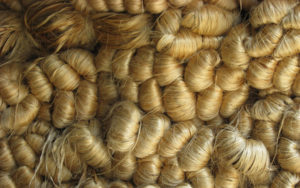Published in The Daily Sun on Saturday, 5th November 2016
Jute demand on the Rise
Mandatory jute packaging law pays off
Hasibul Aman
 Domestic demand for jute saw a rise, leading to a jump in production and better prices for the jute growers on the back of implementation of the Jute Packaging Act, which makes use of jute mandatory in packaging across businesses.
Domestic demand for jute saw a rise, leading to a jump in production and better prices for the jute growers on the back of implementation of the Jute Packaging Act, which makes use of jute mandatory in packaging across businesses.
25 to 26 crore jute sacks were used last year to raise the local consumption by 8 to 10 lakh bales of jute following the execution of the act, according to the Department of Jute.
Demand for jute is expected to rise further as the government plans to include nine more products, mostly spices and potato, on the packaging list.
A year earlier, domestic jute consumption was only 3 lakh bales with only 1.5 to 2 crore jute sacks used, mostly by the state-run department of food.
The ‘Mandatory Jute Packaging Act-2010’ came into effect from 1st January 2014 but building necessary awareness among businessmen about the act took another one and a half years for an efficient enforcement of the law.
The law makes it mandatory to use jute bags in the packaging of paddy, rice, wheat, maize, fertiliser and sugar. The violators will face the maximum one-year jail term or a fine of Tk 50,000 or both for using non-degradable synthetics to package those items.
“We’ve got a tremendous outcome from the Mandatory Jute Packaging Act as domestic use of jute sacks jumped to 25 to 26 crore units last year,” said an official of Department of Jute.
“Apart from increasing the internal demands, which has remained a major concern for the government in recent years, the act also helped boost the jute manufacturing sector,” he said.
Some closed jute mills under Bangladesh Jute Mills Corporation (BJMC) are now being reopened while other BJMC mills are running round the clock to meet the increased local demand for jute sacks, he informed.
Some 37,000 to 38,000 workers are now working in three shifts in the BJMC factories, although the state-run agency used to struggle to run its factories in two shifts with limited number workers two years ago, officials said.
Meanwhile, raw jute price soar year-on-year to Tk 1,600 to Tk 2,000 per maund at the start of harvesting season this year from Tk 1,200 to Tk 1,300 last year following the government decision of procuring raw jute directly from the growers, market observers said.
Dr Khondaker Golam Moazzem, additional research director of private think-tank Centre for Policy Dialogue (CPD), said the mandatory packaging act contributed to a rise in local jute consumption.
“Domestic demand of jute shot up after the enforcement of the mandatory packaging act. It can be assumed by the rising trends of jute production, use and price,” he told daily sun.
He said they had earlier projected that local demand for jute would rise by nearly 60 percent after putting in place of the law. He also put emphasis on expansion of the local market for reviving the jute sector.
Raw jute export fell from 21.12 lakh bales in 2010-11 fiscal year to 11.74 lakh bales in 2015-16 fiscal year, while production increased from 78 lakh bales to 84.40 lakh bales, according to Jute Department figures.
Raw jute use by local jute goods manufacturing sector soared to 65 lakh bales last year from 56 lakh bales a year ago.
Although raw jute use by BJSA mills remained static at 35 lakh bales, that of BJMC mills increased to 15 lakh bales from 10 lakh bales and that of BJMA mills rose to 15 lakh bales from 11 lakh bales in a year, according to Jute Department data.
Still, local use of jute sacks remained below the Jute Department’s estimate of 69 crore units a year following the enforcement of the law.
Officials said the target was not achieved because of reuse of jute sacks and limited enforcement of the law due to some ground reality and apathy by some businessmen.
They said fertiliser is now being spared because of its sensitivity to humidity but the indifference of poultry and fish feed, and flour businessmen to using jute sacks were not understandable to them as they use poly-linings inside WPP bags.
“What is the problem of these businessmen in using jute sacks instead of WPP bags? They can easily use the extra polyethene they now use inside the WPP bags inside the jute sacks,” said a jute department official.
Dr Moazzem also put special emphasis on proper enforcement of the Mandatory Jute Packaging Act to expand domestic market for jute and jute goods.
He suggested that the government must maintain a protective market for jute. “At the same time, fair prices of jute should be ensured in the local market so that the country does not face any anti-dumping lawsuit,” he added.


